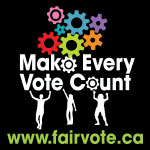For Immediate Release
Jan. 26, 2017
Canadians are smart. In spite of being handed a biased survey, they were able to wade through leading questions and still outline their preference for voting systems that require politicians to cooperate and work together – a key feature of proportional representation systems.
The report on the MyDemocracy survey says:
“The findings suggest that Canadians generally prefer a deliberative government over a decisive one. They express a consistent preference for parties that compromise with one another rather than those that act unilaterally.”
Asked five different ways during the survey, Canadians came back again and again to this conclusion: 
- governments considering all viewpoints when making a decision was the top priority of respondents.
- 70% said several parties should have to collectively agree before a decision is made, while only 30% preferred a government where one party can make decisions on its own.
- 62% said it’s better for several parties to govern together than for one party to make decisions, with only 29% opposed.
- 62% said governments should have to negotiate policy decisions with other parties, with only 24% disagreeing.
- 65% said there should be a greater diversity of views in Parliament
What is most surprising is how a) VoxPop’s Executive Summary fails to highlight these strong results, and b) how some media have chosen to spin the results ignoring the strong call for proportional representation. The VoxPop report notes: “Over the past quarter-century, Canadians have consistently expressed general satisfaction with the way their democracy works.” FVC Board Member, Wilf Day, adds “the current survey shows once again Canadians are generally satisfied with Canada’s democracy. However, the survey failed to ask Canadians if they are satisfied with the voting system.”
The Special Committee on Electoral Reform (ERRE) did a similar survey and asked straight forward questions about the voting system which were easily understood and needed no interpretation. They found 71.5% of Canadians wanted a system that respected voter intention where the proportion of overall votes match the percentage of seats on the House of Commons.
The government now has considerable information available as to what Canadians are saying about their values, as represented in various surveys, including the ERRE online survey (Appendices E and F of the ERRE report), MP town hall meetings, 13 previous studies and commissions, various polls and this survey. The majority call has been for equal and effective votes – proportional representation.
Canadians are done with 39% false majorities and winner-take-all politics. The Government’s time table is still on track to deliver the legislation in May and we can’t wait!
-30-

